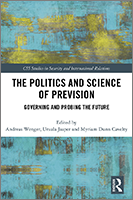We Do That Once Per Day

Cyclical Futures and Institutional Ponderousness in Predictive Policing
Author(s): Matthias Leese
Editor(s): Andreas Wenger, Ursula Jasper, Myriam Dunn Cavelty
Book Title: The Politics and Science of Prevision. Governing and Probing the Future
Publisher(s): Routledge
Publication Year: 2020
